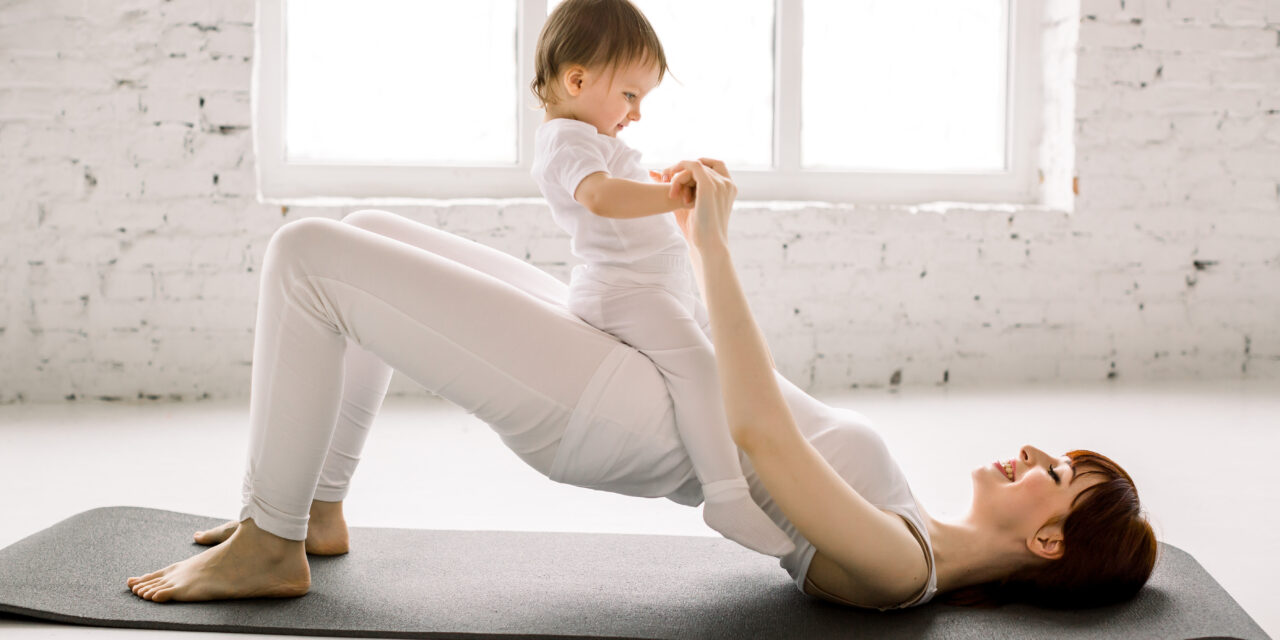A year or so ago, a group of my friends gathered for a mommy happy hour.
We watched our kids play happily while we finally got a break, had some “mommy juice” and connected on all thing’s motherhood. At one point, one of my crazy friends got the idea to show us her back flip on the trampoline. It wasn’t long before most of us were jumping on the trampoline and laughing. Then a few of my friends, subsequently, wet their pants while jumping… literally. I’m sure you can imagine the laughter that followed that one, which once again made a few more friends have a leak in their pants. It was a day I’ll never forget.
How had we gotten to the point where this was the norm? And why was it so funny?
While carrying a child and giving birth can be a beautiful and incredibly rewarding experience, it can also forever alter a woman’s physicality.
For years I have heard friends complain about their sagging abs, pain in their back, or laughed as others have had accidents in their pants, but what it boils down to in my eyes is women not receiving enough post-partum support.
I recently spoke to Dr. Kat Vigo about the issue.
Vigo owns Painless Pregnancy, a concierge at-home physical therapy company specializing in pregnancy and post-partum care.
She and fellow Doctor of Physical Therapy, Dr. Cara Hoffer treat women for a wide range of issues including pain, urinary incontinence, sexual discomfort, diastasis recti abdominis and issues with the pelvic floor. They say there isn’t enough awareness about the issues women face after pregnancy.
“I had a physician, a great physician, to see after giving birth, and my interest in this came to me after going to my doctor and seeking out help,” explained Hoffer. “My doctor had very little knowledge about the pelvic floor therapy industry.”
One of the most common issues facing women is some level of urinary incontinence after birth. So why do we settle for this?
“A lot of women think pelvic floor issues… ‘Ok I’m just going to sit here and do some kegels,’ when actually sometimes you can leak because your pelvic floor is too tight,” explained Vigo. “Or sometimes we leak because our pelvic bones are still stretched in the birthing pattern.”
Vigo knew women needed help, but also education. “We work with moms from every walk of life. Teachers, lawyers, doctors, we serve all of them,” said Vigo. “Just like when you find out you are pregnant and you choose an OBGYN to work with, we want you to have a physical therapist,” she explained. “It’s when your body is going through the most physical changes and so you need an expert to be with you by your side and help you as you go through that journey.”
Her South Florida practice, Painless Pregnancy, offers at home visits to women so privacy is at the forefront and they are able to effect change in all types of circumstances. They also now offer telehealth services and have a large following on social media. “A lot of time, post-partum moms don’t know where to start,” Hoffer said. “There is often a pause between giving birth and your first post-partum visit, but there is definitely a lot of work that can be done in early weeks and early phases to give moms a nice strong foundation to go back to strengthening.”
Vigo and Hoffer have seen women’s lives changed, without surgery, and they say it’s never too late. “One of our clients was 62,” Vigo shared. “Your body is very capable of healing and there are a ton of conservative things you can do without going through surgery.”
While post-partum work is incredibly rewarding and important, the doctor duo says that capturing a patient in the first trimester of pregnancy will allow them to make the most impact.
“At that point you feel awful. You have no energy, and you are puking. We tend to be not moving that much. We lose muscle mass and range of motion, so we want to get in there right away to help you keep your baseline,” Vigo explained.
Not only will It help your body, but studies have shown that it also aids in the birthing process. “We do have good data to show that conservative measures can decrease C-section rate and decrease the time in labor,” Vigo says. “We also see a strong trend toward successful vaginal deliveries, and we do see a trend with shorter labors.”
It seems apparent that there should be a stronger relationship between physical therapists and OB/GYN doctors or midwives. But until that exists, Dr. Hoffer says it starts with you. “We need to empower from the moms. Moms need to ask for help.”
If you feel you can use help, Vigo says to check out their Instagram and facebook pages for tips. They can be found @painlesspregnancy. There they have posted some amazing videos to get you started, but it is important for you to find your own therapist as well. Dr. Vigo can help connect you to a doctor near you, regardless as to where you live.
“We can make an impact in as little as 10 minutes a day,” Vigo says. “If we can have a concentrated 10 minutes a day, we will take it.”
Interested in learning more?
If you’re pregnant or postpartum and looking for relief related to childbirth, Doctors of Physical Therapy at Painless Pregnancy can help. Painless Pregnancy services clients in Palm Beach, Broward and Miami-Dade Counties in Florida, as well as online nationwide through telemedicine appointments. Head over to Painless Pregnancy now and be sure to tell them that Lizzie sent you!
Click here to contact Painless Pregnancy today!
For more information, or to learn more about their services email [email protected] or visit www.painless-pregnancy.com.
















